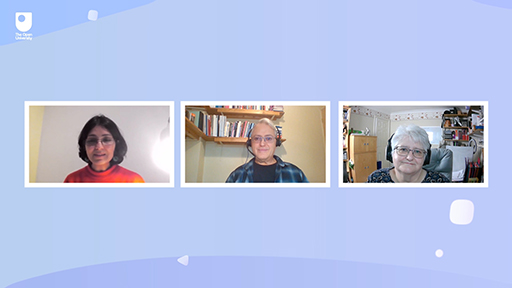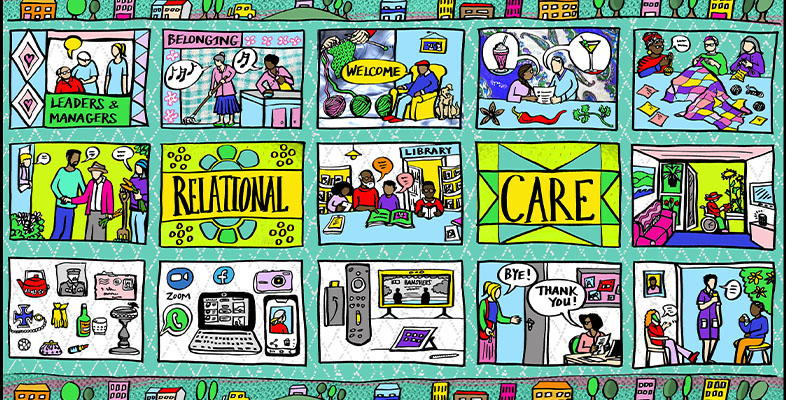3.1 Every relationship matters
A vignette is like a little snapshot from a film of real life: it tells you about what a particular situation looks like and gives insights into what it might feel like for those involved. The vignette in the following activity will help you deepen your understanding of relational care practice.
Activity 6 Elaine’s vignette
The following vignette is an extract from an interview with a cleaner called Elaine. She works in a sheltered housing setting, Holly Trees, which, like Fairview care home, enables and sustains relational care. Read what she says about life in Holly Trees and then answer the questions below. If you’re working as a group, discuss your answers with the group.
Elaine on life at Holly Trees
Whenever we get a new resident, I always show them how to use the washing machine and the easy way to make their bed. When we have done that – it might happen over a few weeks – I ask them to show me something they can do. I have been very surprised about what I have learnt from the residents! Last week Priti (a new resident) showed me how to use an iPad which I couldn’t do before. She was over the moon when I grasped it.
It’s also my job to talk to them about what’s on the menu and help them choose. I often tell them what I would like to eat and would not like to eat – we have a lot of fun when that happens!! I feel having the time to talk them through the menus helps me to get to know them and for them to know me.
Myself and the other cleaners, as well as the gardeners and maintenance staff, are all routinely included in all team meetings and training like any other member of the care staff.
- To what extent do you think Elaine is empowering the residents and giving them a sense of value?
- What are the benefits to everyone in Holly Trees of Elaine having the time to spend with residents in this way?
- Are there any problems that you think might arise when staff and residents take a mutual interest in each other?
- Is including everyone in staff meetings a good practice or could there be some problems?
Discussion
Transitioning into a new environment can be difficult for older adults. In familiarising Priti with her new home, Elaine is helping her settle in well. Spending time with the residents during her work shift means that she is getting to know them as a person including their likes and dislikes. Importantly she approaches her work – her ‘job’ – in a way that encourages a two-way flow of interaction, exchange, and learning. This has allowed her to build a relationship of trust with the resident that both are comfortable with. However, a challenge might be pressure from managers and resulting constraints on time. But as you can see, it is important to invest in relationships for long term wellbeing of residents and staff. When people know and trust each other, challenges that arise might be easier to solve as insights into triggers and solutions (that come through knowing) are also available.
Staff and residents being interested in each other as ‘persons’ can become problematic where, for instance, the continuity of staff is threatened, a resident’s escalating need for care requires a move to a different care setting, or if a resident dies. Close relationships can make staff and residents vulnerable too, which in turn can impact on their wellbeing. For example, care workers may experience grief and distress, or residents may hesitate to develop close relationships with staff or other residents for fear of losing them. There is also the potential for allegations of abuse when relationships are close. Developing adequate support mechanisms and strategies that equip staff with skills to support each other and the residents are important and form a part of relational care.
Cleaning work is often associated with maintaining hygiene and health and housekeeping but rarely with providing relational care (Muller, Armstrong and Lowndes, 2018). Unusually, in this care setting the cleaners’ responsibilities do include personal care in relation to menus and the vignette illustrates how much the interaction and the contact is valued by the resident and Elaine. It gives them both a sense of self-worth. Time that Elaine spends with residents while cleaning and discussing menus is critical for developing the relationship. Being included in staff meetings on a regular basis means that Elaine can readily share the knowledge she has about residents with other members to create good conditions for care. The challenges involved with organising meetings that all staff can attend means that creative ways of allowing staff to share information with the wider team need to be found, e.g. daily short shared briefings.
The next activity encourages you to reflect and summarise your learning from this course.
Activity 7 Reflecting on your learning
Watch the conversation with members of a team from a care setting and a sheltered housing setting in Video 5, reflecting on their experiences and thoughts about care work practice. As you listen think about the question below and make notes in the text box provided.
What key things about relational care that you have learnt so far in this course are reflected in this video?

Transcript: Video 5 Joanne and Shaun
Discussion
Depending upon your role, you may have identified some of the following:
- The importance of feeling acknowledged and valued.
- The importance of acknowledging and appreciating staff.
- Staff having the freedom to relate with residents.
- Satisfaction gained from mutual engagement and learning with residents.
- Significance of support from care manager and other staff.
- Staff having opportunities to grow in the role.
In this section, you have had the opportunity to deepen your learning and understanding of relational care practice. Many more useful vignettes about the different ways in which you can use relational care in practice are in the toolkit written specifically for practitioners entitled Making every relationship matter: a practitioner toolkit for relational care with older people. [Tip: hold Ctrl and click a link to open it in a new tab. (Hide tip)] This toolkit will help you find out more and further understand how relational care can become part of your practice and be embedded in your care setting. As well as practical examples, it offers food for thought and answers some of the questions often raised about relational care.
You may well already be doing some or most of these things, and some other shifts to relational care can easily be introduced by making changes to existing practice. Others may seem more complicated to introduce. For instance, in shaping practice where relationship building is more difficult (e.g. where people are living with dementia, have challenging behaviour or are very distressed) and may require a change of direction in practice, management, and ultimately, from the provider running the care setting.
